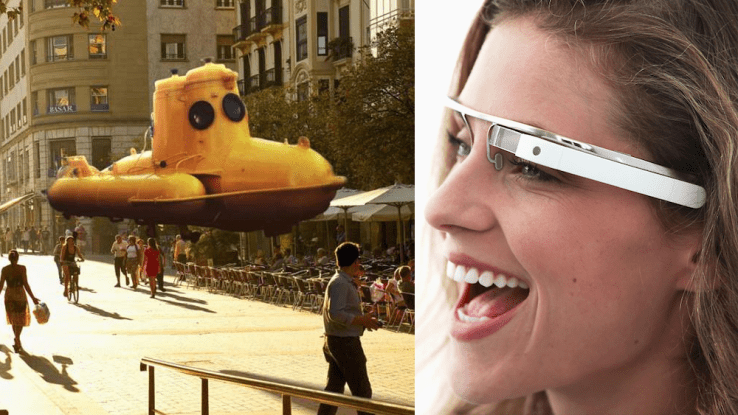Google Patents Holograms For Glass, Which Could Involve Magic Leap
 Today Google was granted a patent for using holograms in a head mounted display like Google Glass. It would effectively let Google create augmented reality experiences that superimpose computer-generated imagery (CGI) atop the real world. Filed in March 2014, the patent shows Google’s research into how it could merge its head mounted display technology with AR.
Today Google was granted a patent for using holograms in a head mounted display like Google Glass. It would effectively let Google create augmented reality experiences that superimpose computer-generated imagery (CGI) atop the real world. Filed in March 2014, the patent shows Google’s research into how it could merge its head mounted display technology with AR.But what’s perhaps more fascinating is how the patent contextualizes Google Inc leading the $542 million funding round for augmented reality startup Magic Leap. One possibility is that Google’s smart eyewear could be the hardware platform for Magic Leap‘s AR content.
When asked about the patent and its significance, I got this boilerplate no-comment response from Google: “We hold patents on a variety of ideas – some of those ideas later mature into real products or services, some don’t. Prospective product announcements should not necessarily be inferred from our patents.” But let’s dive a little deeper, though the patent might never be exercised and there’s no official word on how it could relate to Magic Leap.
While Google’s original Glass initiative faltered due to the hardware’s clunkiness and lack of real-world utility, it’s still in the smart eyewear game. It’s selling versions of Glass for enterprise, according to 9To5Google’s Stephen hall. Meanwhile, Business Insider’s Jillian D’Onfro recently reported that Google is trying to revive the Glass initiative through what it’s calling Project Aura.
One way to make smart eyewear more useful would be to allow projected content to interact and react to the real-world behind it, rather than just being pasted on top. The new patent “Lightguide With Multiple In-Coupling Holograms For Head Wearable Display” details how Google could potentially do this with augmented reality via holograms. It describes how “with augmented reality the viewer’s image of the world is augmented with an overlaying CGI, also referred to as a heads-up display”.Over the past few years, Magic Leap has filed a bunch of trademarks for forthcoming augmented reality content. These include characters, titles, and games like Super Bionic Bitforce, Roadkill Warriors, Monsta Battle, Moonstone Monsters, Moonsters, and my personal favorite, Flutterboard, which refers to “flying sentient skateboards”. The startup also released this demo video of how augmented reality gaming could work:
This patent and trademark research came from legal technology firm SmartUp Legal. The company’s founder Mikhail Avady tells me “I believe Google wants Magic Leap to be the content provider for Google Glass. If we look at their trademark applications, it shows very story and content based trademarks. Magic Leap wants to turn the world into a movie theater and Google wants it to be through Glass.”
That could be a logical factor in why Google Inc, not Google Capital or Google Ventures, but the core technology company itself, led the half-billion dollar round in Magic Leap. For Glass to become a popular augmented reality platform, it will need great content — something Google’s never been great at it. But with tons of gaming talent, Magic Leap could perhaps one day make must-see AR experiences that run on Google’s hardware.
0 Response to "Google Patents Holograms For Glass, Which Could Involve Magic Leap"
Post a Comment